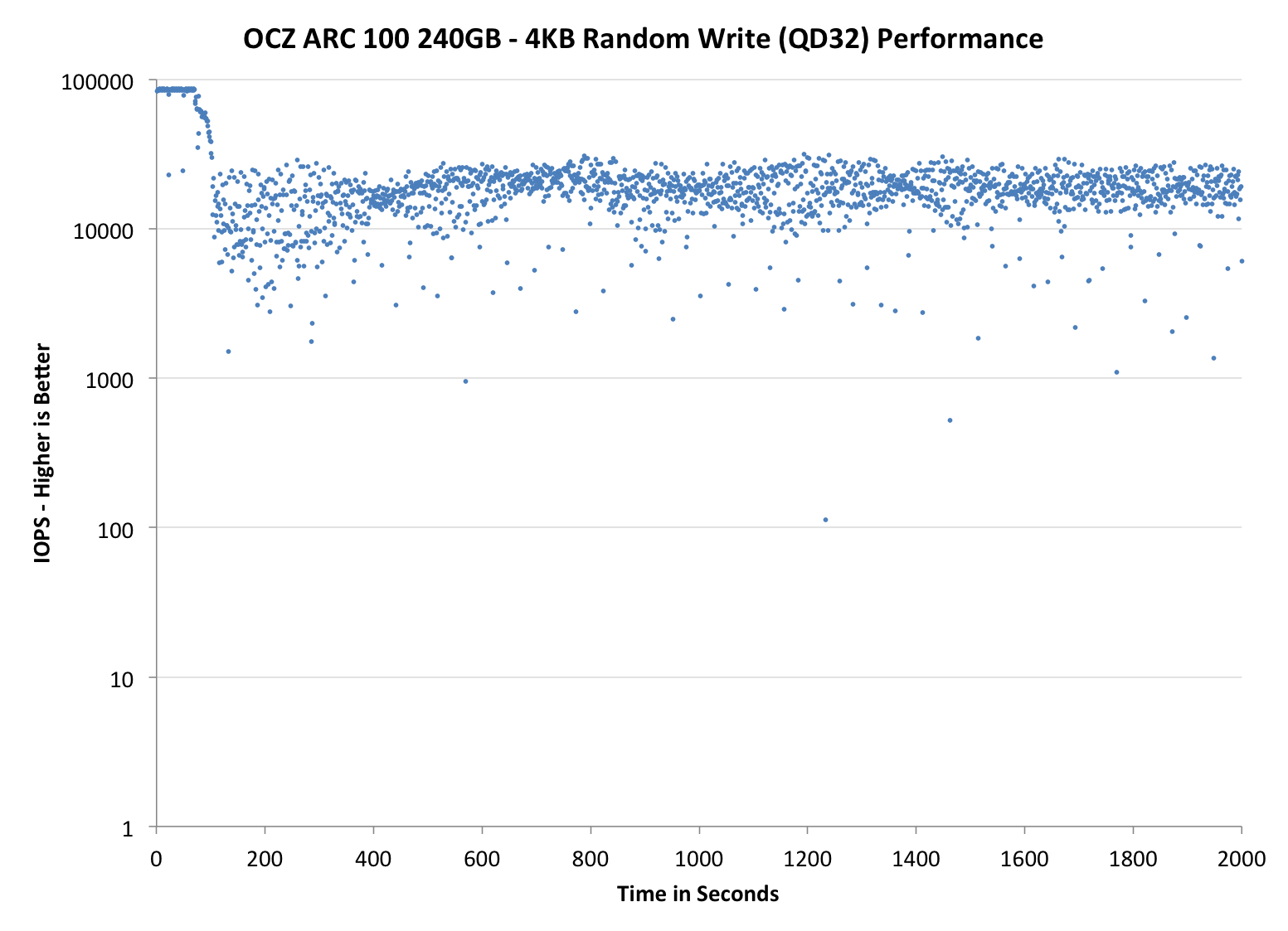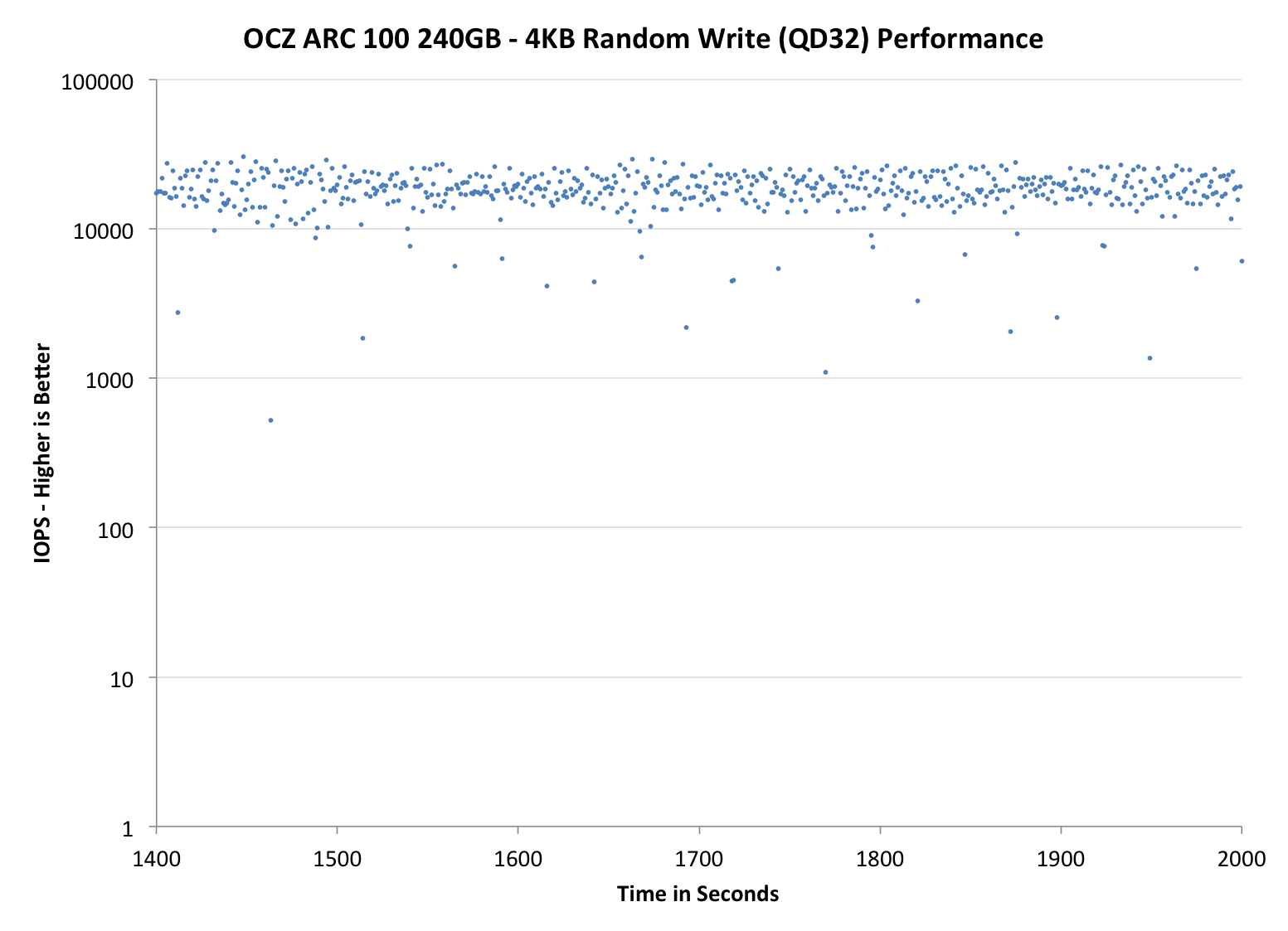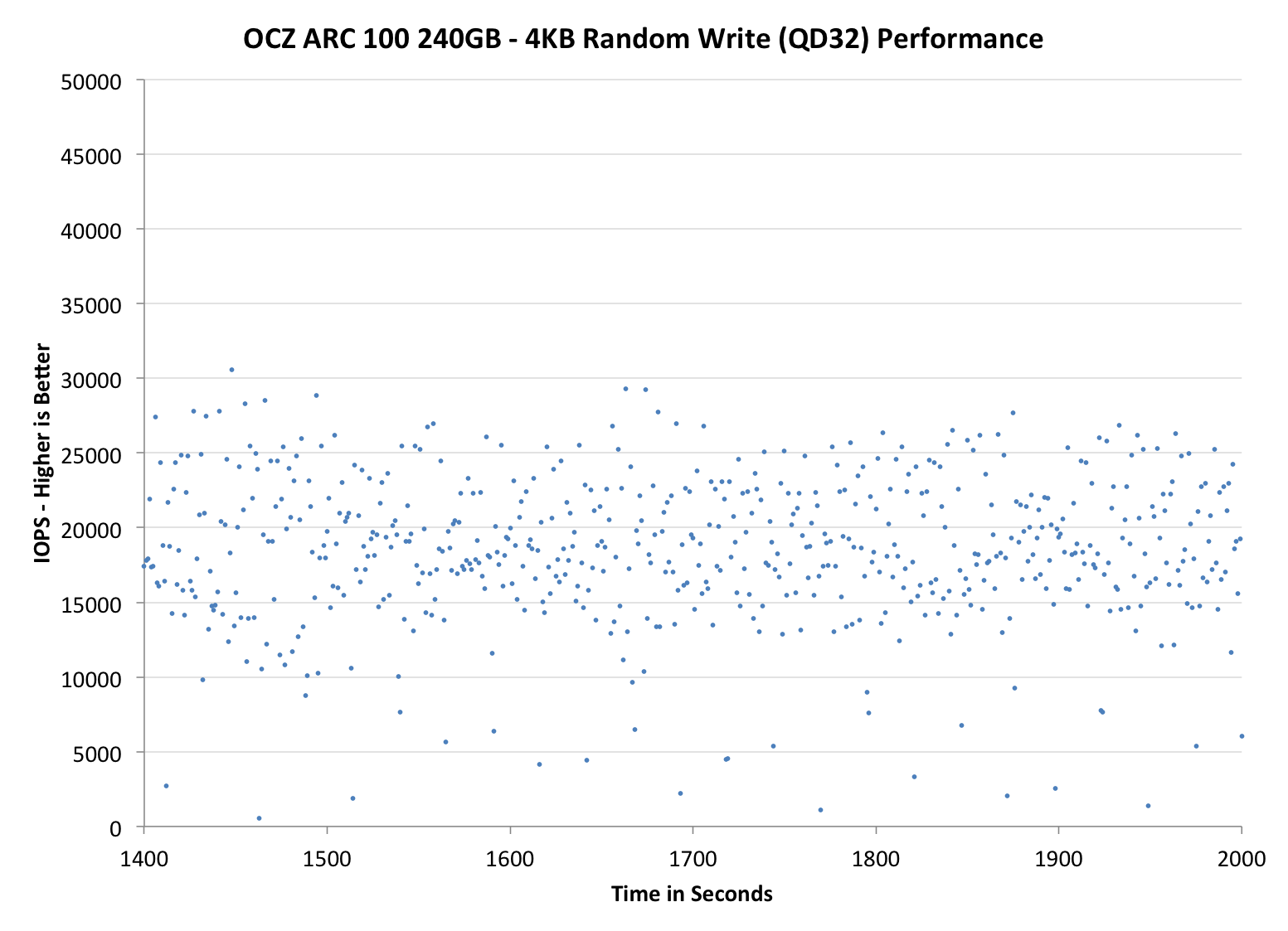OCZ ARC 100 (240GB) SSD Review
by Kristian Vättö on August 26, 2014 7:00 AM ESTPerformance Consistency
Performance consistency tells us a lot about the architecture of these SSDs and how they handle internal defragmentation. The reason we do not have consistent IO latency with SSDs is because inevitably all controllers have to do some amount of defragmentation or garbage collection in order to continue operating at high speeds. When and how an SSD decides to run its defrag or cleanup routines directly impacts the user experience as inconsistent performance results in application slowdowns.
To test IO consistency, we fill a secure erased SSD with sequential data to ensure that all user accessible LBAs have data associated with them. Next we kick off a 4KB random write workload across all LBAs at a queue depth of 32 using incompressible data. The test is run for just over half an hour and we record instantaneous IOPS every second.
We are also testing drives with added over-provisioning by limiting the LBA range. This gives us a look into the drive’s behavior with varying levels of empty space, which is frankly a more realistic approach for client workloads.
Each of the three graphs has its own purpose. The first one is of the whole duration of the test in log scale. The second and third one zoom into the beginning of steady-state operation (t=1400s) but on different scales: the second one uses log scale for easy comparison whereas the third one uses linear scale for better visualization of differences between drives. Click the dropdown selections below each graph to switch the source data.
For more detailed description of the test and why performance consistency matters, read our original Intel SSD DC S3700 article.
 |
|||||||||
| Default | |||||||||
| 25% Over-Provisioning | |||||||||
The performance consistency takes a small hit compared to the Vector 150 and Vertex 460, but compared to the other value drives the ARC 100 offers amazing consistency. Most of the performance gain is due to the higher default over-provisioning (12% vs 7% in other value SSDs), although the Barefoot 3 platform has always done well when it comes to consistency. While there is quite a bit of variation in IOPS, the average is still somewhere between 15K and 20K IOPS, whereas for example the MX100 only provides about 5K IOPS at steady-state.
 |
|||||||||
| Default | |||||||||
| 25% Over-Provisioning | |||||||||
 |
|||||||||
| Default | |||||||||
| 25% Over-Provisioning |
|
||||||||










54 Comments
View All Comments
HisDivineOrder - Tuesday, August 26, 2014 - link
"The Barefoot 3 platform does provide excellent performance consistency and it has proven to be reliable over the last two years""The Barefoot 3 platform does provide excellent performance consistency...has proven to be reliable over the last two..."
"...excellent performance consistency...has proven to be reliable..."
"...consistency...reliable..."
Wut? You can't be serious. Go read the reviews by actual users. OCZ products have far higher one-star reviews and failures than any other serious equivalent. Or do you guys really think the rest of the world is wrong about their reliability and you're right? ;)
Kristian Vättö - Tuesday, August 26, 2014 - link
Here is some actual data from NewEgg and Amazon for you:OCZ Vector 150 & Vertex 460 combined: 89.2% are 5 or 4-star reviews - 7.8% 1-star
Crucial M500: 91.1% are 5 or 4-star - 4.6% 1-star
Samsung 840 EVO: 94.1% 5 or 4-star - 2.3% 1-star
OCZ's sample size was much smaller and there were only 13 one-star reviews in total, so the results are not really scientifically accurate. There were several one-star review due to the fact that OCZ denies warranty if bought from an uncertified reseller, so the number of failures is smaller in reality.
Either way, your claim that OCZ has "far higher one-star reviews" isn't true. It used to be true and I don't deny that, but the OCZ today is totally different company with new management and owner. Things are only going to get better with Toshiba helping OCZ with validation.
Per Hansson - Tuesday, August 26, 2014 - link
Yea, but OCZ still shows up in hardware.fr reliability survey as the black sheep.No matter how much they say they want to improve their reputation the numbers don't lie:
http://www.hardware.fr/articles/920-7/ssd.html
Sure it's better than the 50% RMA rates for the Petrol & Octane series, but then again those where never even recalled by OCZ so in my mind they can just go MIA!
http://www.hardware.fr/articles/893-7/ssd.html
mapesdhs - Wednesday, August 27, 2014 - link
Ah yes and no other manufacturer ever screwed things up?... In reality they've all
chucked out bad fw, but people forgave the likes of Intel and Samsung when they
did that. OCZ changed its policies, started producing excellent models, yet people
still post the same old guff about Octane/Petrol models.
Ian.
mapesdhs - Wednesday, August 27, 2014 - link
Nonsense. All that stuff was about much older models. The later OCZ SSDs are very good,everything from the Vertex4 onwards. Heck, with the early fw issues sorted out, the previous
models are fine too, I have loads of them.
Ian.
PS. Buyer feedback on a seller site suffers from enormous -ve bias. People who don't
have any issues almost never state the fact. Sats: garbage in = garbage out.
kaesden - Tuesday, August 26, 2014 - link
You couldn't pay me enough to ever trust another OCZ product. I dont care how well they perform, or how cheap they might be, they are the most unreliable memory products i've EVER used.hojnikb - Tuesday, August 26, 2014 - link
They were. Now that sandforce is gone and toshiba is owning them, this is a completly different OCZ as it was a few years ago.hosps - Tuesday, August 26, 2014 - link
Management is still the same and by the CEO's own admission, they have been left largely alone for day-to-day operations. This product is yet another horrible idea just like Octane, Petrol, and Agility. They are undercutting their own product lines with inferior products and dumbfounded why their higher end products don’t sell. They need to follow what Samsung has done and release two product lines and keep it straight. Higher number product numbers = higher expected performance. Stop mixing and matching product lines and tagging them with meaningless numbers that have no sense of order or scale. They keep repeating the same mistakes that led them to bankruptcy and it’s why they won’t survive as a company.hojnikb - Tuesday, August 26, 2014 - link
What toshiba needs to do is rebrand the whole thing; they could just continue using toshiba brandname as they did before ocz acq. but instead use oczs controller and firmware. And as you've said; two models. One highend with MLC flash and one mainstream with A19 tlc (sandisk already has one).That way, product stack will be less of a mess and cost savings when using TLC could also translate to lower MSRP. Which is always good, when competition is stiff.
patssle - Tuesday, August 26, 2014 - link
Once you lose trust it's hard to gain it back. Hard drives are crucial for reliability with all your important data stored on it (and hopefully backed up) - living with the thought of just MAYBE my hard drive isn't good enough is more than enough to not buy that brand. And I was quick to jump on the OCZ bandwagon back when they were the first to bring reliable SSDs mainstream without write delays with the Vertex.